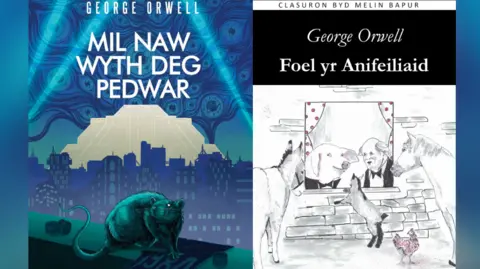Antonia MatthewsBBC Wales

 BBC
BBC
Animal Farm and 1984 were published shortly before Orwell's death in 1950
Two classic novels by George Orwell have been translated into Welsh for the first time.
Animal Farm, a 1945 political allegory inspired by the Russian Revolution, is set in north-west Wales in the Welsh edition, Foel yr Anifeiliaid, with Orwell's classic characters given Welsh names to add authenticity.
Mil Naw Wyth Deg Pedwar, or 1984, Orwell's vision of a bleak totalitarian future, published in 1949, contains a Welsh version of Newspeak, the novel's fictional language.
Both books remain "seminal works with timeless relevance", said Welsh book publisher Melin Bapur, and feel "particularly relevant now in an age of 'alternative facts', AI, and misinformation".
Animal Farm's simple and direct English prose lent itself to a Welsh translation because the Welsh language is "straightforward" and "concrete", said translator Anna Gruffydd.
"Any kind of word play is a nightmare for a translator because it's not going to translate like that, so you've somehow always got to find a way around that," she said.
Having previously translated works including Albert Camus' La Peste and Flann O'Brien's The Third Policeman, she described it as "a pleasure to do".
She gave Orwell's famous characters - which include Napoleon, Old Major and Snowball - new names suited to the landscape.
"I didn't see any virtue in not translating everything, because it's an allegory... It's just any farm anywhere," Ms Gruffydd said.
Her translation, written in the dialect of north-west Wales, also reworks the title to Foel yr Anifeiliaid to make it more "balanced", she said.
Foel or "bare hill" in Welsh is a word often included in Welsh farm names rather than a literal translation of the English word farm.
"The alliteration between the f and l in 'foel' and 'anifeiliaid' made it a more pleasant-sounding title," said Ms Gruffydd,

 Melin Bapur Books/Rowynn Ellis/Massimo Carulli
Melin Bapur Books/Rowynn Ellis/Massimo Carulli
Melin Bapur Books has published the two works by George Orwell simultaneously
Adam Pearce, who founded Melin Bapur and translated 1984 into Welsh, agreed Orwell's "plain, straightforward English lends itself well to literary Welsh".
He added that the "real challenge" in 1984's translation was getting Newspeak - simplified language developed by The Party to control thought - to work in Welsh.
"Welsh grammar is fundamentally different to English, so getting Newspeak to work and translating Orwell's Principles of Newspeak essay was by far the hardest part of the book," he said.
Both translations were published together and Mr Pearce said many readers would likely have read the original, but said a translation offers "a new perspective and a unique voice".
He also said he disagreed with the idea that "there is no market for translations into Welsh from English" because people "can just read the originals".
"I think this fundamentally misunderstands all the various reasons why someone might want to read a book in the first place, especially a book in Welsh," he said.
Mr Pearce has previously translated Tolkien's The Hobbit from English into Welsh and said that while translations into Welsh are comparatively rare, sales show there is an appetite to read these classics in the language.
"With a minority language like Welsh you also have people who maybe like the idea of reading in Welsh, but don't know where to start because Welsh literature is an unfamiliar domain to them," he said.
A book they already know and love can be "a great way in", according to Mr Pearce.
"And of course for learners or others whose Welsh might be imperfect, reading a familiar work in a language you are trying to learn or improve is a great way of doing so."
.png)




